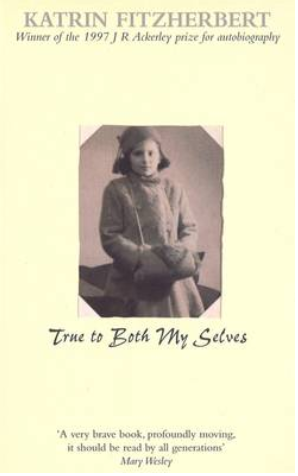
“Anyone who has done a bit of family history research which has taken them into the censuses of the 19th and 20th Centuries will be aware of just how many German citizens there were in Britain in those years. So we must assume that Katrin Fitzherbert’s experiences and feelings must have been mirrored many times over in the 20th C. Other readable examples which spring to mind are Robert Graves (“Good-Bye to all that”) who had a German mother, which caused him several difficulties, and Christabel Bielenberg (“The Past is Myself”) a British woman who married a German lawyer in 1934 and spent WW2 in Germany.
I find that reading the experiences of people resident in Germany during WW2 shows how similar peoples’ lives were on both sides of the front. War diaries of life in Britain show the frustrations of ordinary folk with their own Government, but we never quite (so far as I remember) go to the point of having political officers keeping and eye on us and our remarks.”
― Katrin FitzHerbert, True to Both My Selves: A Family Memoir of Germany and England in Two World Wars
The above is what I have just posted in “Goodreads“, so being an economical sort of chap I have posted it here for good measure. I found the book a fascinating read, especially the early parts about growing up in Germany and life there during the war. Since I am only 3 years older than Katrin many of our experiences are, or were, similar. Her gratitude to Hitler for sorting out the mess left in Germany (or made in Germany) by the 1919 Versailles Peace Treaty and the resultant German Governments attempts to live with its conditions are the same as those of Christabel Bielenberg’s gardener who had served as a soldier in WW1 but whose post war tries at building a new life had come unstuck several times until Hitler assumed power and effectively tore up the Peace Treaty conditions. Life for ordinary folk improved immensely and they were grateful. Katrin Fitzherbert describes very well the good things that the Nazi Party inculcated into its youth, which she continued to value in her life long afterwards, and her awful agonies as the news of the horrors of the “Final Solution” emerged as the war ended. How could the authors of such good aims for young people be at one and the same time the authors and perpetrators of such unimaginably terrible things ?
After the war she and her mother were repatriated to Britain and she took up a new life in which she felt she dare not mention anything about her past, although to her surprise she found that most British people she met were not greatly exercised by people like herself. The snag was that she knew her father had been a loyal member of the Nazi Party and had had an official, though relatively minor, position in the party and had served in it throughout the war. She thought this would redound on her and her mother, but also on her father back in Germany too.

